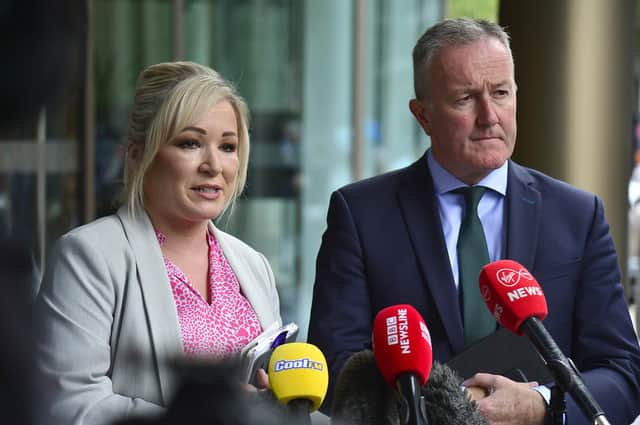Owen Polley: A restored Stormont will be a historic shambles that is easily criticised by a unionist opposition


(‘Opposition is noble, and the DUP should consider the benefits of not going into Stormont executive,’ Wednesday November 29)
His theory was that the party could in that scenario avoid accusations that it was implementing the Windsor Framework and expose the failings of our wee pretendy government (to paraphrase Billy Connolly’s view of the Scottish parliament).
Advertisement
Hide AdAdvertisement
Hide AdA couple of days later, it was the Ulster Unionists, rather than the DUP, that were reportedly considering going into opposition, if devolution returned. “As I stand here talking to you now,” Doug Beattie said, “we are a party who (sic) was in the executive and we will be going back into the executive.”
However, if the UUP cannot support the programme for government, “Then maybe it is a good place for us to be in opposition. An opposition isn’t a negative thing. Opposition helps create good government.”
Earlier in November, the Fermanagh and South Tyrone MLA, Tom Elliott, responded to Peter Robinson’s intervention on the framework debate (discussed in last week’s column) on the social media platform X. The former first minister’s comments, Mr Elliott said, “increased the potential of the DUP returning to Stormont and forming a new government. Attention is also focusing on who might be in the executive and indeed who might be in opposition and not in the executive. Lots of decisions.”
The programme for government (PfG) is supposed to contain a new administration’s plans and aims, but it is always a vague document, full of fine phrases and lacking real detail. This ambiguity is arguably necessary to bring together a mandatory coalition of parties that share few common values or objectives. But the idea that the contents of the PfG will be decisive for the UUP is unconvincing.
Advertisement
Hide AdAdvertisement
Hide AdIf Stormont does return, the attractions of opposition, for either of the two larger unionist parties, are obvious. We’re told that any new executive will tackle every problem from the cost of living to climate change, but, in reality, even compared to the shambles of previous devolved administrations, it is likely to be a historic low.
The largest party in any power-sharing arrangement is set to be Sinn Fein. Aside from the party’s support for the IRA’s terrorist campaign, it advocates a form of left-wing populism that is precisely the opposite of responsible government.
When she was the health minister, Michelle O’Neill commissioned the Bengoa Report, which made essentially the same recommendations for reforming our hospitals as a series of previous reviews. These included centralising services in fewer acute hospitals and improving community care.
In Sinn Fein’s heartlands, like South Armagh and Fermanagh, the party is already campaigning energetically to keep all services in local hospitals open. The idea that it will support what needs to be done to modernise our NHS Northern Ireland-wide is risible.
Advertisement
Hide AdAdvertisement
Hide AdThe budget is arguably a more important document for any executive than the flannel in a PfG. The last administration failed to deliver one at all. But Sinn Fein’s finance minister, Conor Murphy, claimed that he was on the brink of delivering a document that would, among other things, slash hospital waiting lists.
You could be forgiven for forgetting, but the Northern Ireland Fiscal Council (NIFC), which is charged with providing ‘transparency’ on Stormont’s use of taxpayer’s money, said Murphy’s budget lacked a coherent strategy and failed to set out its priorities properly. The NIFC found a lack of evidence that there was any plan to spend new money for health wisely and doubted that the effects of cuts to other departments had been thought through.
The executive, then, is unlikely to do much good, but it could do some harm. There is a consensus, among the non unionist parties at least, for introducing ill conceived changes to the justice system and draconian hate speech legislation that threatens to reach into people’s private lives and affect freedom of speech.
If you can name a fashionable but poorly thought through political idea, you can be certain that there will be ministers at Stormont supporting it. And, probably, these days, they will be in a majority.
Advertisement
Hide AdAdvertisement
Hide AdThat’s why, if the executive does come back, and a unionist party is in opposition, it is unlikely to have a shortage of material, if it wants to provide a critique of what is wrong with the administration. The proviso is that there would be no point offering another populist take from the sidelines and claiming that we can have even more tax-payer funded goodies.
Northern Ireland badly needs a political party that’s prepared to be honest, realistic and responsible in its appeal to voters. That may mean, sometimes, telling truths that are difficult for people to hear. They would surely appreciate and respect that candour.
If Stormont is revived, and if one of the unionist parties goes into opposition voluntarily, it would put its rivals in a difficult position. Sitting alongside Sinn Fein, while it preens, poses and delivers nothing of worth, could be an unpopular and lonely position for any pro-Union leader, without the cover of fellow unionists.
It is, admittedly, ironic that the UUP is exploring opposition as an option, given that it has repeatedly urged the DUP to get back into a power-sharing government. As Tom Elliott observed, though, if Stormont did come back, each of the parties would at least have an interesting dilemma.